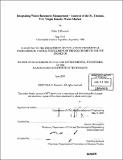| dc.contributor.advisor | Dennis McLaughlin. | en_US |
| dc.contributor.author | Buscemi, Pablo E. (Pablo Edgardo), 1964- | en_US |
| dc.contributor.other | Massachusetts Institute of Technology. Dept. of Civil and Environmental Engineering. | en_US |
| dc.date.accessioned | 2005-10-14T19:51:48Z | |
| dc.date.available | 2005-10-14T19:51:48Z | |
| dc.date.copyright | 2003 | en_US |
| dc.date.issued | 2003 | en_US |
| dc.identifier.uri | http://hdl.handle.net/1721.1/29324 | |
| dc.description | Thesis (M.Eng.)--Massachusetts Institute of Technology, Dept. of Civil and Environmental Engineering, 2003. | en_US |
| dc.description | Includes bibliographical references (p. 103-105). | en_US |
| dc.description.abstract | The purpose of this thesis is to contribute to the understanding of the water resources management of the St. Thomas water market. By applying the framework for Integrated Water Resources Management, the actual water resources situation in the island was analyzed. This framework requires meeting three criteria: economic efficiency in water use, environmental and ecological sustainability, and equity in the access to water for all the population. The study includes the assessment of available water supply and water demand by use, and the evaluation of alternative and feasible supply options to augment freshwater resources. Three potential main supply strategies for freshwater supply were identified and compared based on: 1) economic efficiency in water use, 2) environmental and ecological sustainability, and 3) equity in the access to water for all people. Four integrated strategies for future development and management of water resources in the island were recommended: 1) Gradually phasing out desalination based on distillation as the main strategy of water supply. This supply can be replaced with distributed reverse osmosis desalination and by importing water by submarine pipeline from Puerto Rico. 2) Gradually expanding the distribution system to the entire population, applying the funds saved by shifting to more cost-effective and sustainable freshwater supply alternatives. 3) Developing water trading policies within the island as well as with neighboring islands. 4) Improving accountability for available water supplies, which is a basic need for water managers and planners informed decision making. | en_US |
| dc.description.statementofresponsibility | by Pablo E. Buscemi. | en_US |
| dc.format.extent | 114 p. | en_US |
| dc.format.extent | 4935562 bytes | |
| dc.format.extent | 4935371 bytes | |
| dc.format.mimetype | application/pdf | |
| dc.format.mimetype | application/pdf | |
| dc.language.iso | eng | en_US |
| dc.publisher | Massachusetts Institute of Technology | en_US |
| dc.rights | M.I.T. theses are protected by copyright. They may be viewed from this source for any purpose, but reproduction or distribution in any format is prohibited without written permission. See provided URL for inquiries about permission. | en_US |
| dc.rights.uri | http://dspace.mit.edu/handle/1721.1/7582 | |
| dc.subject | Civil and Environmental Engineering. | en_US |
| dc.title | Integrating water resources management : analysis of the St. Thomas, U.S. Virgin Islands, water market | en_US |
| dc.type | Thesis | en_US |
| dc.description.degree | M.Eng. | en_US |
| dc.contributor.department | Massachusetts Institute of Technology. Department of Civil and Environmental Engineering | |
| dc.identifier.oclc | 52717740 | en_US |
